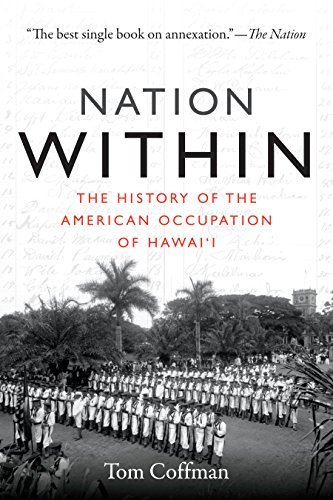
Non-Fiction Resources
Our recommendations
-

Nation Within: The History of the American Occupation of Hawaii
Tom Coffman | Hawaii
The question, "How did the distant island kingdom of Hawaii become part of the United States?" has been buried by a combination of American mythology and American denial. But that question has taken on new urgency in context of Native Hawaiian demands for a restoration of self-government. The takeover of this independent nation of long standing was America's first confusing venture into overseas imperialism. As such, it was the antecedent to the colonization of the Philippines, the overthrow of numerous governments of weak but friendly nations and, currently, the occupation of Iraq. In 1893, only two percent of the kingdom of Hawaii's population was of American descent, but the colonizers in Hawaii and the architects of American expansion in Washington were importantly connected by common origins an intertwining of missionaries, financiers, sugar growers and politicians. Nation Within describes how, in the wake of the overthrow of the Hawaiian monarchy in 1893, an interim government of five years duration was established that borrowed heavily from the Jim Crow American south. In 1895, Hawaiians attempted a counterrevolution, and two hundred Hawaiians, along with their Queen, were jailed by a martial law court. After much resistance, Americans were pulled along into the imperial proposition by Theodore Roosevelt (then assistant secretary of the Navy) and the American philosopher of sea power, Alfred Mahan. Their multi-pronged strategy was based on controlling Latin America, building the Panama canal, and dominating the Pacific by controlling Hawaii. Did Native Hawaiians really go along with this, as has so ofte been claimed? The answer lay dormant nearly a hundred years in the American archive: Native petitions vigorously protesting annexation submitted by virtually every living Hawaiian. An additional six petitions were submitted to the U.S. Congress by the Hawaiian leadership. They hoped to get their country back, but their efforts were crushed by the Spanish-American War, which began not in Cuba (as most people imagine) but with destruction of the Spanish fleet in the Philippines. When American troops were committed to put down the Filipinos, Hawaii became the forward base for a new Pacific empire the sovereignty of its people and their nation extinguished.
-

Orientalism
Edward Said | Asia
More than three decades after its first publication, Edward Said's groundbreaking critique of the West's historical, cultural, and political perceptions of the East has become a modern classic.
In this wide-ranging, intellectually vigorous study, Said traces the origins of "orientalism" to the centuries-long period during which Europe dominated the Middle and Near East and, from its position of power, defined "the orient" simply as "other than" the occident. This entrenched view continues to dominate western ideas and, because it does not allow the East to represent itself, prevents true understanding. Essential, and still eye-opening, Orientalism remains one of the most important books written about our divided world. goes here
